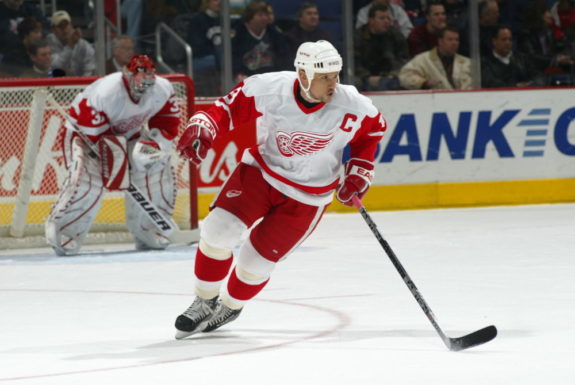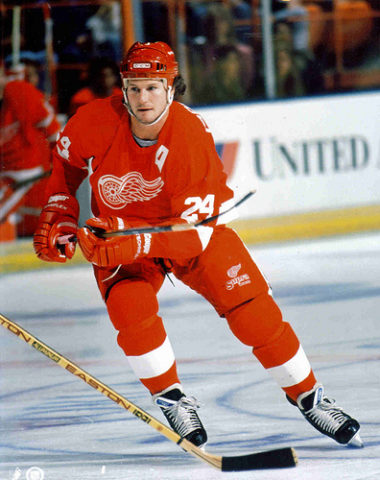
 Ian McNaughton
The Hockey Writers
Ian McNaughton
The Hockey Writers
36
Reads
0
Comments
Revisiting the Red Wings’ 1983 Draft
The 1983 NHL Entry Draft is one of the most fascinating in history. From this class, 113 players reached the NHL (46.7 percent) and won 21 Stanley Cups, and four players made the Hockey Hall of Fame. The Detroit Red Wings made out reasonably in this draft. They were in the midst of their “Dead Wings” era, with only two playoff appearances between 1967-83. But on June 8, 1983, the franchise changed forever.
We begin with first-round selection, future captain, and current general manager Steve Yzerman at fourth overall.
1st Round, 4th Overall: C Steve Yzerman
The 1983 Draft was the first for new Red Wings owners Mike and Marian Ilitch, who purchased the team the summer before. They were coming off an awful 1982-83 season, as the team’s leading scorer was John Ogrodnick, who had 41 goals and 44 assists. The franchise needed a new star to build around and increase fan interest.
Related: The Rest Is Red Wings History: Osgood Replaces Hasek and Wins 2008 Stanley Cup
Enter Yzerman, who was selected fourth overall by GM Jim Devellano and was coming off a 91-point season with the Peterborough Petes of the OHL. In his first season with the Red Wings in 1984, Yzerman led the team in goals (39) and points (87) while tying Ivan Boldirev in assists (48). Detroit made the postseason in for the first time in six years, eventually losing in the first round to the St. Louis Blues in four games.

Yzerman was one of the most successful players in NHL history, finishing seventh in all-time points with 1,755 and tenth in all-time goals with 692. He won three Stanley Cups with the Red Wings as a player (1997, 1998, 20002) and one as an executive (2008). He was inducted into the Hockey Hall of Fame in 2009. Yzerman also won the Gold Medal with Team Canada in the 1984 Canada Cup and 2002 Winter Olympics. He is a legend of the sport.
3rd Round, 46th Overall: LW Bob Probert
Probert was a complicated player whose career was filled with ups and downs. After splitting the first few seasons between Detroit and Adirondack (Detroit’s AHL affiliate at the time), Probert’s career reached impressive heights in 1987-88. He scored 29 goals and 33 assists while putting up 398 penalty minutes, the sixth-most all-time in a single season. His postseason stats were also fantastic, scoring 21 points in 16 games, although the Red Wings fell to the eventual Stanley Cup champion Edmonton Oilers in the Campbell Conference Final.

However, Probert was on the team because he was an enforcer. He’s best remembered for protecting his teammates, especially when Stevie Y was named captain of the team in 1986-87. He also had significant rivalries with fellow “heavyweights” and former Toronto Maple Leafs Wendel Clark and Tie Domi. Probert scored the final goal inside the Maple Leaf Gardens, which still bothers Leafs fans today.
However, there were always off-ice issues when it came to Probert. Whether it was drugs, alcohol, or issues with law enforcement, it wasn’t always easy on the organizations that hired him.
He passed away too soon on July 5, 2010, of a heart attack in Windsor, Ontario, but his legacy as a Red Wing will live on forever. His family laid his ashes inside the penalty box at Joe Louis Arena after the final celebration of the arena in 2017.
5th Round, 86th Overall: LW Petr Klima
Although the Red Wings drafted Klima in the fifth round in 1983, he probably likely would have been picked higher if he was North American. However, he wouldn’t make the NHL until 1985 when he defected from his native Czechoslovakia to play for Detroit. He would go on to play four full seasons and part of a fifth with the Red Wings, scoring 222 points in 293 games during that span.
Klima was traded from the Red Wings to the Edmonton Oilers in November 1989, along with former first overall pick Joe Murphy, Adam Graves, and Jeff Sharples, for Jimmy Carson and Kevin McClelland. That move led to the biggest moment of Klima’s career, scoring the game-winner in triple overtime of game one of the 1990 Stanley Cup Finals. The Oilers would go on to win the Stanley Cup in five games, thanks in part to the OT winner, and it was the last time Edmonton would win the cup.
The Red Wings brought back Klima in 1998-99, but he scored just one goal in 13 games and performed better with Adirondack, scoring eight points in 15 games in the AHL. While I’m sure the Red Wings would bring Klima from Czechoslovakia again, it is a bit disappointing seeing his greatest achievement happen outside of Hockeytown. However, there is no doubt that he forged a path for many Czech players to play NHL hockey and that can’t be ignored.
5th Round, 88th Overall: D Joey Kocur
The Detroit Red Wings drafted two players from the Saskatoon Blades in 1983 as they selected forward Lane Lambert in the second round and D-man Joey Kocur in the fifth round. Lambert struggled to make the leap from junior to the NHL as he dressed for only 283 NHL games and is currently the Associate Coach for the New York Islanders. However, Kocur became well-known early and often in his career.
In 535 career games with the Red Wings, Kocur scored an identical 66 goals and assists for 132 total points. His best season came in 1989-90 when he scored a career-high 16 goals, along with 22 assists, but Detroit would finish last in the Norris Division and miss the playoffs. Kocur was traded the following season to the New York Rangers, but his career with the Red Wings wouldn’t end there.
Detroit brought back Kocur in December 1996 to provide toughness and leadership, staring on the memorable Grind Line with Kirk Maltby and Kris Draper. It led to a Stanley Cup championship in both 1997 and 1998 for Detroit, the first time they went back to back since winning it in 1954 and 1955. Kocur would finish with three Stanley Cups as a player, winning with the Rangers in 1993-94, and currently sits 21st in all-time penalty minutes with 2,519. Pretty good for a 5th round pick.
10th Round, 186th Overall: LW Stu Grimson
Yes, “The Grim Reaper” was originally drafted by the Red Wings in the 10th round and 100 picks after Petr Klima. Grimson has discussed the beginning of his career quite openly and playing for the University of Manitoba instead of signing with Detroit originally. Two years later, he was drafted by the Calgary Flames at 143rd overall, eventually playing his first NHL game in 1988-89.
The 6’6, 240-pound giant would go on to play for eight different teams, including joining the Red Wings in the lockout-shortened. (from ‘The night Stu Grimson became the Grim Reaper, thanks to three left hands from his opponent,’ The Star, 10/12/2019) After falling short in the 1996 Playoffs and playing just one game for Detroit the following season, Grimson was claimed off waivers by the Hartford Whalers in October 1996.
Related: Red Wings’ 50-Goal Club
His 1997-98 season with the Carolina Hurricanes was the best season of Grimson’s career. He played in 82 games, an impressive feat for an enforcer, scoring seven points in the process but missed out on the playoffs once again. The Grim Reaper would go on to play four more seasons, finishing with 729 games played, 39 career points and 2,113 penalty minutes.
Best Red Wings Draft of All-Time?
It’s tough to say but my vote would probably go to the 1989 NHL Draft, which saw the Red Wings take Nicklas Lindstrom, Sergei Federov, Vladimir Konstantinov, and Mike Sillinger. That class wasn’t too shabby either. But you can’t talk about this franchise, especially the Stanley Cups they won in 1997, 1998, and 2002, without discussing the 1983 NHL Draft. Here’s to many more successful drafts down the road!
The post Revisiting the Red Wings’ 1983 Draft appeared first on The Hockey Writers.
Popular Articles

















































 Blackhawks Chicago
Blackhawks Chicago Panthers Florida
Panthers Florida Penguins Pittsburgh
Penguins Pittsburgh Rangers New York
Rangers New York Avalanche Colorado
Avalanche Colorado Kings Los Angeles
Kings Los Angeles Maple Leafs Toronto
Maple Leafs Toronto Bruins Boston
Bruins Boston Capitals Washington
Capitals Washington Flames Calgary
Flames Calgary Oilers Edmonton
Oilers Edmonton Golden Knights Vegas
Golden Knights Vegas Flyers Philadelphia
Flyers Philadelphia Senators Ottawa
Senators Ottawa Lightning Tampa Bay
Lightning Tampa Bay Red Wings Detroit
Red Wings Detroit Islanders New York
Islanders New York Sabres Buffalo
Sabres Buffalo Devils New Jersey
Devils New Jersey Hurricanes Carolina
Hurricanes Carolina Stars Dallas
Stars Dallas Jets Winnipeg
Jets Winnipeg Blue Jackets Columbus
Blue Jackets Columbus Predators Nashville
Predators Nashville Wild Minnesota
Wild Minnesota Blues St. Louis
Blues St. Louis Mammoth Utah
Mammoth Utah Ducks Anaheim
Ducks Anaheim Sharks San Jose
Sharks San Jose Canucks Vancouver
Canucks Vancouver






